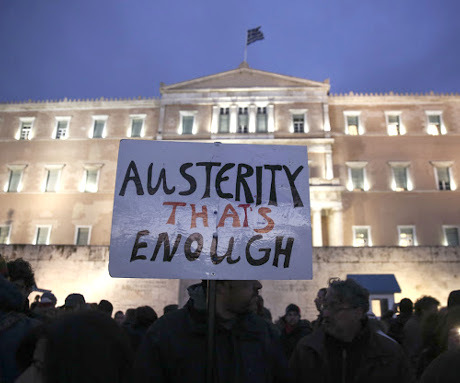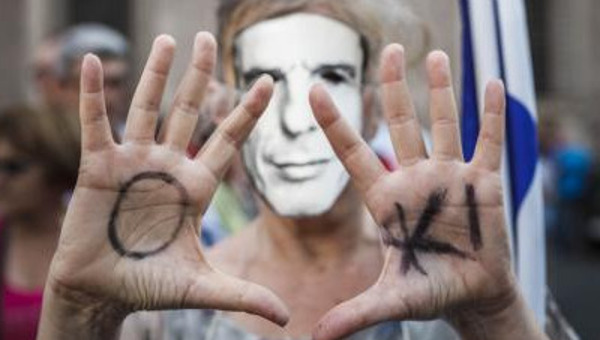All eyes on the Left are upon Greece. Not because of a general interest in the contradictions of capitalism in the midst of this particular crisis but because of Syriza. Unfortunately, what we are observing is not unique to Syriza. The story has been told before, and the story inevitably will occur again if we do not learn from it. Rather than debating the arguments of individuals (many of them good comrades) who may hold different views, I think it is essential to try to understand how this happened and why.
 Let me begin by setting out my premises, which may be sufficient to draw a red line between my argument and that of some others:
Let me begin by setting out my premises, which may be sufficient to draw a red line between my argument and that of some others:
1. For several years, Syriza has been the hope of the working-class in Greece, Europe and in every country suffering from neoliberalism and austerity. It was sending a message that a better opposition was possible; and as such it was an inspiration to similar anti-austerity struggles (in particular, that of Podemos in Spain).
2. European and Greek capital was determined to kill that messenger. Accordingly, it was and is relentless in its determination to send a quite different message: TINA, there is no alternative to neoliberalism and austerity.
3. Despite its programme as a party, the platform on which it was elected to govern and a strong popular vote endorsing its rejection of the demands of European capital, the Syriza government totally capitulated and accepted a colonial status for Greece.
4. It is never too late (or too soon) to unleash the creative power of the masses.
The Construction of Syriza
Syriza didn’t drop from the sky. It took shape as the result of a process through which different political groups gained experience in working together. Beginning in particular with the Space for Dialogue at the beginning of the century and continuing with the developments and protests in the Social Forum and in the common struggle against neoliberalism and austerity, the Coalition of the Radical Left (Syriza) emerged – one in which Synaspismos (the old eurocommunist formation), environmental, Trotskyist and Maoist formations found a common interest in working together. And that coalition attracted young people in particular because of its support of struggles in the streets in the context of the Social Forum (mobilized by the slogans of ‘people before profit’ and ‘another world is possible’), and it emerged increasingly as a pole of attraction as people rejected the neoliberal and austerity packages that right-wing and social democratic governments imposed following the dictates of the Troika. In the June 2012 elections, Syriza received almost 27 per cent of the vote and became the main opposition party to the governing coalition of rightwing and social democratic parties.
Syriza also didn’t drop from the sky in that its perspective reflected the ideas of socialism for the 21st century. Its founding document as a unitary party in July 2013 declared that the possible other world is the world of socialism with democracy and freedom, the world where the needs of people come before profit. There was the explicit rejection of capitalism but also the insistence that the socialist alternative is ‘inseparably tied to democracy’ – a conception of democracy in which workers can plan, manage and control with the purpose of satisfying social needs, a democracy not merely formal but necessarily incorporating direct democracy with the active participation of all.
Our goal, Syriza’s founding Congress declared, is socialism for the 21st Century, and its declaration reflected the understanding that this goal requires you to walk on two legs – both to capture the existing state and reverse policies supportive of capital and also to build and nurture the elements of a new socialist state based upon self-government from below.[1] Particularly urgent, of course, was the need to defeat the policy memoranda and to change the government, given the misery that these were imposing upon the Greek people. Accordingly, in its political resolution, Syriza declared it would cancel the memoranda and the implementing laws, would place the banking system under public ownership, would cancel planned privatizations and the looting of public wealth, would rehire all state employees who have been laid off, and would renegotiate the loan contracts and cancel their onerous terms following an audit of the debt. We commit ourselves, Syriza promised, to tackle any possible threats and blackmail from the lenders with all possible means we can mobilize, and we are certain that the Greek people will support us. As its old slogan, “no sacrifice for the euro,” indicated, Syriza’s absolute priority was to prevent humanitarian disaster and to meet social needs, and not to submit to obligations taken on by others.
To build the new economy based upon social solidarity, though, more than the rupture with neoliberal state policies through government degrees was necessary. A more profound rupture was required for a socialist regeneration – rupture with a society characterised by patriarchy, rupture with the drive toward ecological destruction, rupture with subordination of everything to the market. And, this was a lesson taught by the social and political movement through its struggles in the streets, its demonstrations, social solidarity networks and initiatives based on disobedience. Syriza, the programme declared, has learned from its participation with its forces in all these forms of social movements. It has learned the necessity for a broad self-governing movement in which direct democracy flourishes, and it recognizes the need to reform the entire local government and to nurture forms of popular self-organization that can systematically pressure institutions. To create the space in which governing from below can flourish, the political resolution declared that a Syriza government would introduce the concept and practice of democratic planning and social control at all levels of central and local government and that it would promote democracy in the workplace through workers’ councils composed of representatives elected by and recallable by workers. Here was the second leg upon which Syriza meant to advance – fostering the cells of a new socialist state from below.
But Syriza also learned another lesson through its direct participation in the social and political movements – the importance of a unified, mass, democratic, multi-tendency party. Drawing upon communist, radical, regenerative, anticapitalist, radical feminist, ecological, revolutionary and libertarian left streams, Syriza stressed the importance of respecting inevitable internal differences and thus the need to ensure that differing political assessments would be represented through internal democracy. Just as it had learned by participating in the movements to fully respect opposite opinions, so also did it seek to apply this internally. Syriza, the founding congress declared, “systematically endeavors to be a model of the society it seeks to build.”
The Path to Social Democracy
Something happened, however, in the approach to new elections. In September 2014, Syriza presented its electoral programme, the Thessaloniki Programme. As in its earlier positions, the programme stressed the need for a new government that would challenge the neoliberal austerity demands of the Troika and, in particular, would reduce the debt. Yet, there were some obvious differences. There was no pledge to cancel the memoranda and the implementing laws, no call for public ownership of the banks, no declaration that planned privatizations and the looting of public wealth would be canceled. Indeed, there was no explicit critique of capitalism.
In place of any anti-capitalist (let alone, socialist) measures was a National Reconstruction Plan which focused upon restarting the Greek economy through public investment and tax reduction for the middle class. Recovery and growth (along with a negotiated moratorium on debt servicing) would rescue the Greek economy and allow it to ‘gradually’ reverse all the memorandum injustices, ‘gradually’ restore salaries and pensions and rebuild the welfare state. Economically, the Thessaloniki Programme was based upon Keynesian (not even post-Keynesian) theory, and it supplemented its focus upon aggregate demand stimulation by proposed measures to deal with the humanitarian crisis (e.g., subsidies for meals, electricity, medical care and public transit for the poor and unemployed).
Although there was little sign of the earlier determination to use the state to make inroads upon capital, the Thessaloniki Programme did suggest the possibility of introducing measures which could foster development of the cells of a new state. A Syriza government, it pledged, would empower citizen’s democratic participation (including institutions of direct democracy) and would introduce democratic measures such as a people’s veto and a people’s initiative to call a referendum. Important democratic openings promised but, again, nothing challenging capital (as the demand for workers’ councils and workers’ control would). Everything in the electoral programme was consistent with support for capital. The proposal contained in that programme was to walk on two legs to social democracy.
Some may praise Syriza’s tactical ‘realism’ while others criticise it for deviating from its socialist programme. It is not the central issue. More significant is what followed Thessaloniki – a classic example of path dependency. While there may be extended discussion of steps along the way (‘errors’ and ‘mistakes’ identified) and new exciting revelations about events and threats, it must be admitted that, from its initial retreats in post-electoral negotiations with the Troika to its successive surrenders to its ultimate rout and capitulation, Syriza has followed the familiar trajectory of social democracy. And, it is, of course, the path followed earlier by PASOK which also promised social democracy and ended up enforcing the neoliberalism and austerity to which Syriza has now agreed. To this, the Syriza government has added the unique step of calling for a popular referendum against austerity proposals and then negating the Greek people’s negation.
Of course, Syriza (like PASOK before it) faced a very difficult situation when it came to relations with its European creditors – especially given its commitment to remaining in the eurozone. But there are always choices. In a talk in Cuba in 2004, I proposed that “when capital goes on strike, there are two choices, give in or move in.” Unfortunately, I noted, “when capital has gone on strike, the social-democratic response has been to give in” and the result is to reinforce the logic of capital.[2] Subsequently, in a private exchange with a Syriza activist in May 2013, I returned to this trope and wrote: “when the organized forces of finance capital of the European Union demand sacrifice from the working-class of Greece (and not only Greece but also Portugal, Spain, etc.) and have the power under the existing set of institutions, there are two choices: give in or move out. And, however these options may be muddied in the minds of both masses and Syriza leadership, as the crisis continues the clever dancing of Syriza leadership will be less and less convincing.”
Was the appropriate focus, then, upon moving out? “Would I call for an immediate departure from the euro? That would not be very wise,” I argued, “compared to an alternative of opening the books in order to ensure ‘fair’ taxation, canceling the debt, capital controls, nationalization of the banks, etc. i.e., policies which would be clearly presented as policies in the interests of the working-class, class policies. This would inevitably create a condition in which remaining within the euro zone would not be possible or, indeed, permitted. But, then, the departure would not be the result of the waving of a national flag but rather the result of class struggle politics. In short, I think the latter would necessarily lead to departure from the euro and I think that should be anticipated and planned for.”
As was always apparent (to both friends and enemies), though, the Syriza leadership was determined that Greece not move out of the eurozone and, above all, was committed to do everything possible to prevent it. So, it did give in but not before euros moved out of Greece.
Another Path is Possible
Any country that would challenge neoliberalism inevitably will face the assorted weapons of international capital. The central question, then, is whether a government is “willing to mobilize its people on behalf of the policies that meet the needs of people.”[3] And this was the question I posed about Syriza in 2013: “do the stances taken by the Syriza leadership (e.g. the strong reluctance to abandon the euro, the apparent backtracking on cancellation of the debt [negotiation], etc.) foster or weaken the movements from below? My worry, as you may guess, is that the latter is true.”
Unfortunately, it was true. A government can win the battle against neoliberalism, I argued in 2004, but only if it is “prepared to break ideologically and politically with capital, only if it is prepared to make social movements actors in the realization of an economic theory based upon the concept of human capacities.” If it is not, “such a government inevitably will disappoint and demobilize all those looking for an alternative to neoliberalism; and, once again, its immediate product will be the conclusion that there is no alternative.”[4] The Syriza government was not prepared to break ideologically and politically with capital, and it was not prepared to mobilize the masses.
There are always choices. We can take the path of ‘defeats without glory’ (Badiou) characteristic of social democracy or we can move in the direction of the revolutionary democracy that builds the capacities of the working-class. At the core of the latter is that it embraces the centrality of the concept of revolutionary practice – “the coincidence of the changing of circumstances and human activity or self-change.” It begins, in short, by grasping the ‘key link’ of human development and practice that Marx consistently stressed. Revolutionary democracy recognizes that every activity in which people engage forms them. Thus, there are two products of every activity – the changing of circumstance or things and the human product.
Recognizing the importance of the ‘second product’, the human product of activity, is absolutely essential for a government which is serious about building socialism because it stresses the necessity to build the capacities of the working-class. In a paper I wrote for Chavez in December 2006, I asked:
“What’s the significance of recognizing this process of producing people explicitly? First, it helps us to understand why changes must occur in all spheres – every moment that people act within old relations is a process of reproducing old ideas and attitudes. Working under hierarchical relations, functioning without the ability to make decisions in the workplace and society, focusing upon self-interest rather than upon solidarity within society – these activities produce people on a daily basis; it is the reproduction of the conservatism of everyday life.
“Recognizing this second side also directs us to focus upon the introduction of concrete measures which explicitly take into account the effect of those measures upon human development. Thus, for every step two questions must be asked: (1) how does this change circumstances and (2) how does this help to produce revolutionary subjects and increase their capacities?”[5]
Despite all that has occurred, revolutionary democracy is still a path open to the Syriza government. As a government, it can introduce measures that can help to produce revolutionary subjects and to unleash the creative energies of the masses. Further, it can use its power as government not only to support the development of a new state from below but also to ensure that the existing state (with its police, judicial, military, etc powers) is not under the direct command of capital. These are possibilities for Syriza still as government, and it would be tragic if its story were to end as a defeat without glory.
But, as the story of PASOK demonstrates, this would not be the first time for such an ending. That is what makes the denouement of Syriza a ‘teachable moment.’ We can learn from both the promise of Syriza and its subsequent trajectory – both the way in which its direct involvement in the revolutionary democratic struggles of the social movements produced it as an important political force and also the way in which its refusal to break ideologically and politically with capital left it only with Keynesians of various stripes negotiating the terms of its surrender and with disappointed masses.
Certainly, there is a lesson here for future governments (and perhaps even the current Syriza government) – the absolute necessity to learn to walk upon two legs. But there is also a lesson for us – those of us without the present luxury of government. A socialist party must also walk upon two legs. Of course, it must struggle to capture the existing state from capital so that state can serve the needs of the working-class rather than capital. However, it also must “promote by all means possible new democratic institutions, new spaces in which people can develop their powers through their protagonism.” Through the development of communal councils and workers’ councils (essential cells of the new socialist state), the working-class develops its capacities and the strength to challenge capital and the old state.[6]
The lesson of Syriza should be to never forget the concept of revolutionary practice – the simultaneous changing of circumstances and human activity or self-change. It is never too late to remember and apply this… and never too soon. •





